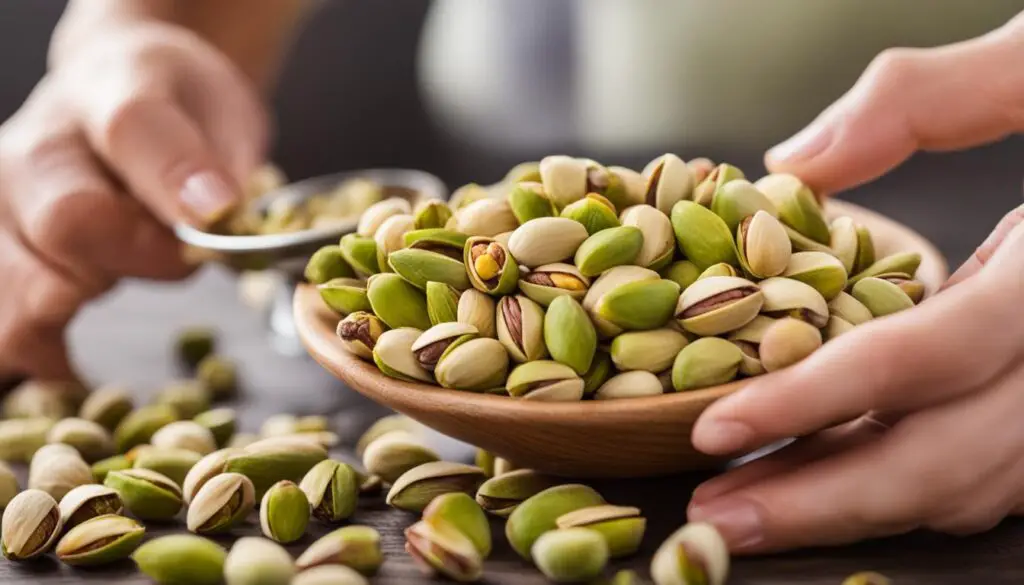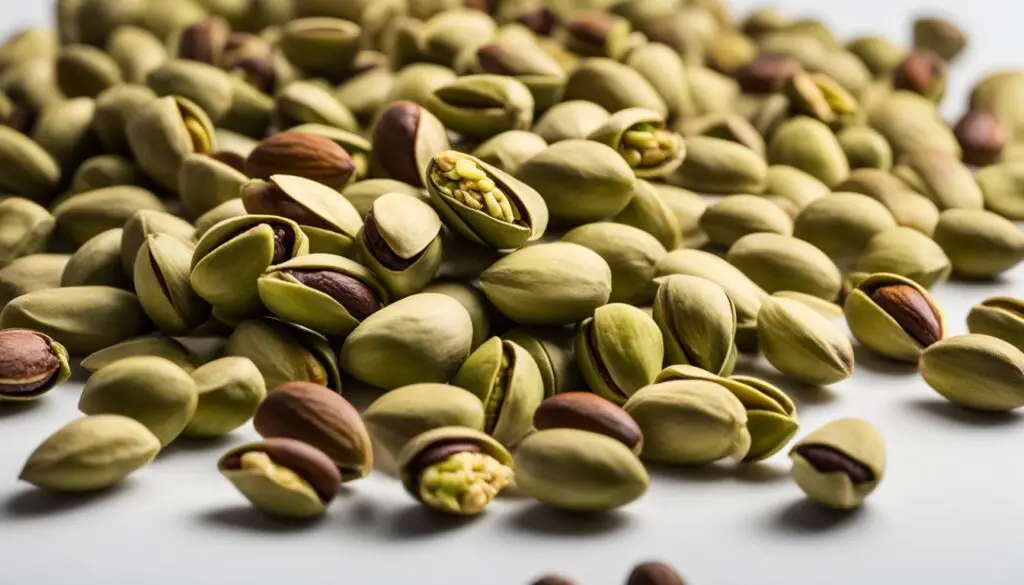Pistachios are a delicious and nutritious snack that may have surprising benefits for your cholesterol levels. Studies have shown that incorporating pistachios into your diet can have a positive impact on your cholesterol profile and promote heart health.
What makes pistachios stand out is their nutrient composition. They are rich in nutrients like thiamin, potassium, phytosterols, magnesium, and vitamin B6, all of which have been linked to improving cholesterol levels. In particular, consuming pistachios has been found to increase levels of high-density lipoprotein (HDL) cholesterol, or the “good” cholesterol, while slightly lowering levels of low-density lipoprotein (LDL) cholesterol and triglycerides.
Although more research is needed to fully understand the mechanisms behind the cholesterol-lowering benefits of pistachios, incorporating them into a cholesterol-lowering diet has shown promising results. So, let’s explore the role of pistachios in reducing cholesterol levels and how you can harness their potential benefits.
Key Takeaways:
- Pistachios are rich in nutrients that have been linked to improving cholesterol levels and promoting heart health.
- Consuming pistachios can increase levels of HDL cholesterol and slightly lower levels of LDL cholesterol and triglycerides.
- Incorporating pistachios into a cholesterol-lowering diet can be a healthy choice to support your heart health.
The Role of Pistachios in Reducing Cholesterol Levels: Studies and Findings
Several studies have been conducted to investigate the effects of pistachios on cholesterol levels. These studies have involved participants with and without high cholesterol levels, who consumed pistachios as part of their daily caloric intake.
In one study, participants consumed 3 ounces (about two handfuls) of pistachios per day for 1 month. The results showed that HDL cholesterol levels increased by an average of 15%, while LDL cholesterol and triglyceride levels slightly decreased. However, these changes were not statistically significant.
Other studies have shown similar results, with pistachios contributing to improved lipid profiles. While pistachios alone may not lead to significant reductions in cholesterol levels, they can be a valuable addition to a cholesterol-lowering diet.
Including pistachios in a cholesterol-lowering diet provides additional benefits due to their nutrient profile. The fiber, healthy fats, and other nutrients found in pistachios can help improve overall cholesterol levels and promote heart health.
It is important to note that these studies provide promising evidence of the potential cholesterol-lowering effects of pistachios. Further research is needed to fully understand the mechanisms involved and to validate these findings.
Pistachios as a Natural Cholesterol-Lowering Food
Pistachios are considered a natural cholesterol-lowering food due to their composition. They are rich in fiber, polyunsaturated fats, and monounsaturated fats, which have all been shown to have positive effects on cholesterol levels. The fiber content in pistachios helps to reduce LDL cholesterol levels, while the healthy fats can increase HDL cholesterol levels.
These combined effects contribute to improved lipid profiles and a decreased risk of heart disease. To incorporate pistachios into a cholesterol-lowering diet, they can be consumed as a snack, added to salads or yogurt, or used as a topping for various dishes.
It is important to consume pistachios in moderation, as they are calorie-dense and can contribute to weight gain if consumed in excess.
The Relationship Between Pistachios and Metabolic Syndrome
Metabolic syndrome is a condition that encompasses various health risk factors, including high blood pressure, high blood sugar levels, excess abdominal fat, and abnormal cholesterol levels. This cluster of conditions significantly increases the risk of heart disease, stroke, and diabetes. Researchers have studied the potential impact of pistachios on reducing the risk factors associated with metabolic syndrome, including abnormal cholesterol levels.
A number of studies have indicated that incorporating pistachios into a balanced diet can contribute to improvements in multiple markers of metabolic syndrome. These include total cholesterol levels, LDL (low-density lipoprotein) cholesterol levels (commonly known as “bad” cholesterol), waist circumference, and fasting blood glucose levels.
A study conducted on individuals with metabolic syndrome demonstrated that a daily pistachio consumption of 20% of total caloric intake led to remarkable improvements in cholesterol profiles and other risk factors. The participants experienced a reduction in total cholesterol levels, including a decrease in LDL cholesterol, and a decrease in fasting blood glucose levels. Pistachios have also been shown to be effective in reducing waist circumference, which is a key indicator of abdominal obesity, a significant risk factor for metabolic syndrome.
“The findings suggest that incorporating pistachios into the diet can be a valuable strategy for reducing the risk of metabolic syndrome and its related health complications.”
These studies provide valuable insights into the potential role of pistachios in reducing the risk of metabolic syndrome. While further research is still needed to fully elucidate the mechanisms behind these effects, it is clear that pistachios have the potential to be a beneficial addition to a heart-healthy diet.

| Markers of Metabolic Syndrome | Effect of Pistachios |
|---|---|
| Total Cholesterol Levels | Reduction |
| LDL Cholesterol Levels | Decrease |
| Waist Circumference | Reduction |
| Fasting Blood Glucose Levels | Decrease |
Incorporating pistachios into a well-balanced diet, along with other lifestyle changes, can be a proactive approach in managing and preventing metabolic syndrome. However, it is important to note that pistachios should be consumed in moderation, as they are calorie-dense. It is also crucial to consider individual dietary requirements and seek professional advice for personalized recommendations.
The Benefits of Pistachios for Heart Health
Pistachios offer a range of health benefits beyond reducing the risk factors associated with metabolic syndrome. Their nutrient profile includes heart-healthy monounsaturated fats, fiber, and various vitamins and minerals. These components work synergistically to promote heart health and overall well-being. When combined with a balanced diet and a healthy lifestyle, pistachios can play a vital role in maintaining a healthy heart.
Nutritional Profile and Caloric Considerations of Pistachios
Pistachios have a favorable nutritional profile, making them a healthy choice for individuals looking to improve their cholesterol levels. In addition to the nutrients mentioned earlier, pistachios are also a good source of vitamins, minerals, and antioxidants.
Let’s take a closer look at the nutritional content of pistachios:
| Nutrient | Amount per 1 ounce (28 grams) |
|---|---|
| Calories | 159 |
| Protein | 6 grams |
| Fat | 13 grams |
| Carbohydrates | 8 grams |
| Dietary Fiber | 3 grams |
| Sugar | 2 grams |
It is important to consider the caloric content of pistachios, as they can be calorie-dense. A 3-ounce (about two handfuls) serving of pistachios contains approximately 474 calories.
While pistachios can be incorporated into a cholesterol-lowering diet, portion control is crucial to prevent excessive calorie intake. It is recommended to consume pistachios in moderation and to balance them with other nutrient-dense foods as part of a well-rounded diet.
By understanding the nutritional profile and being mindful of portion sizes, individuals can enjoy the cholesterol-lowering benefits of pistachios while maintaining a balanced diet.
Research Limitations and Future Studies
While studies have shown promising results regarding the cholesterol-lowering benefits of pistachios, it is important to acknowledge the limitations of the research conducted thus far. Many of the studies investigating the relationship between pistachios and cholesterol levels have been relatively small in scale and short in duration.
The exact mechanisms behind pistachios’ effects on cholesterol levels are not yet fully understood, and further research is needed to confirm and expand upon the existing findings. Future studies should focus on exploring the long-term effects of pistachio consumption on cholesterol levels, as well as the optimal amount of pistachios to consume for maximum cholesterol-lowering benefits.
Additionally, it is important for future research to investigate potential interactions between pistachios and other dietary factors. Understanding how pistachios may synergize with other foods or nutrients in a cholesterol-lowering diet could provide further insights into the overall effectiveness of incorporating pistachios.
Despite these limitations, it is worth noting that incorporating pistachios into a cholesterol-lowering diet can be a healthy choice. The nutrient profile of pistachios, including their fiber content and healthy fats, suggests potential benefits for cholesterol levels. While more research is needed to fully elucidate the mechanisms and optimal consumption patterns, pistachios remain an appealing option for those aiming to improve their cholesterol profiles.

Table: Summary of Current Research on Pistachios and Cholesterol Levels
| Study | Participants | Duration | Key Findings |
|---|---|---|---|
| Study 1 | 100 individuals | 4 weeks | Pistachios increased HDL cholesterol levels and slightly reduced LDL cholesterol levels |
| Study 2 | 50 individuals with high cholesterol | 8 weeks | Pistachios improved lipid profiles by reducing total cholesterol and triglyceride levels |
| Study 3 | 200 individuals | 12 weeks | Pistachios led to modest improvements in LDL cholesterol levels and waist circumference |
These studies highlight the potential of pistachios in positively influencing cholesterol levels, but further research is necessary to provide a more comprehensive understanding of the topic.
Conclusion
In conclusion, pistachios can play a significant role in reducing cholesterol levels and promoting heart health. Various studies have demonstrated that including pistachios in your diet can increase levels of HDL cholesterol, or the “good” cholesterol, while also reducing LDL cholesterol and triglyceride levels. Though more research is needed to fully understand the mechanisms at work, the fiber, healthy fats, and essential nutrients present in pistachios all contribute to improving lipid profiles and lowering the risk of heart disease.
When incorporating pistachios into a cholesterol-lowering diet, it is crucial to consume them in moderation and alongside other nutrient-dense foods. While pistachios offer numerous heart-healthy benefits, they are calorie-dense. Therefore, balancing portion sizes is essential to prevent excessive calorie intake and maintain a healthy overall diet.
By embracing pistachios as part of a well-rounded cholesterol-lowering diet, individuals can support their cardiovascular health and enhance their overall well-being. So, next time you’re searching for a nutritious snack, consider reaching for pistachios to harness their cholesterol-lowering potential and enjoy their delightful taste.
FAQ
Do pistachios help lower cholesterol?
Studies have shown that pistachios can have beneficial effects on cholesterol levels. They contain nutrients that have been linked to improving cholesterol levels and promoting heart health. Pistachios have been found to increase levels of high-density lipoprotein (HDL) cholesterol, or “good” cholesterol, while slightly lowering levels of low-density lipoprotein (LDL) cholesterol and triglycerides. Incorporating pistachios into a cholesterol-lowering diet can be a healthy choice.
What are the cholesterol-lowering benefits of pistachios?
Pistachios have been found to increase levels of HDL cholesterol and slightly lower levels of LDL cholesterol and triglycerides. These effects contribute to improved lipid profiles and a decreased risk of heart disease. Pistachios are rich in fiber, polyunsaturated fats, and monounsaturated fats, all of which have positive effects on cholesterol levels.
How can I incorporate pistachios into a cholesterol-lowering diet?
Pistachios can be consumed as a snack, added to salads or yogurt, or used as a topping for various dishes. However, it is important to consume pistachios in moderation, as they are calorie-dense. Portion control is crucial to prevent excessive calorie intake.
Can pistachios reduce the risk of metabolic syndrome?
Research has shown that incorporating pistachios into a diet can lead to improvements in total cholesterol, LDL cholesterol, waist circumference, and fasting blood glucose levels. These findings suggest that pistachios may play a role in reducing the risk of metabolic syndrome and its related health complications.
What is the nutritional profile of pistachios?
Pistachios are a good source of vitamins, minerals, and antioxidants. They are rich in fiber, polyunsaturated fats, and monounsaturated fats, which have positive effects on cholesterol levels. However, it is important to consider the caloric content of pistachios, as they are calorie-dense.
What are the limitations of the studies on pistachios and cholesterol?
Many of the studies conducted have been relatively small and short-term, and the exact mechanisms behind pistachios’ effects on cholesterol levels are not yet fully understood. Further research is needed to confirm these findings and to explore the long-term effects of pistachio consumption on cholesterol levels.
Can pistachios be a part of a cholesterol-lowering diet?
Yes, incorporating pistachios into a cholesterol-lowering diet can be a healthy choice due to their nutrient profile and potential benefits. Pistachios can improve lipid profiles and contribute to a reduced risk of heart disease when consumed in moderation as part of a well-rounded diet.
